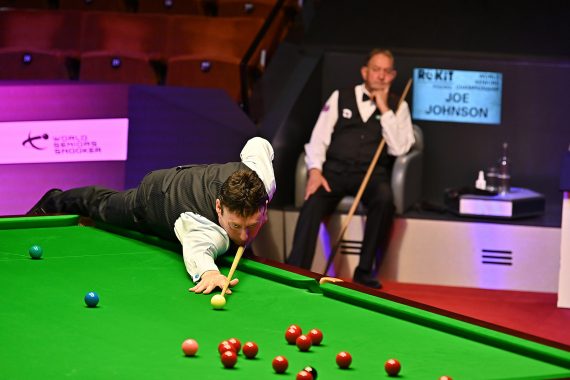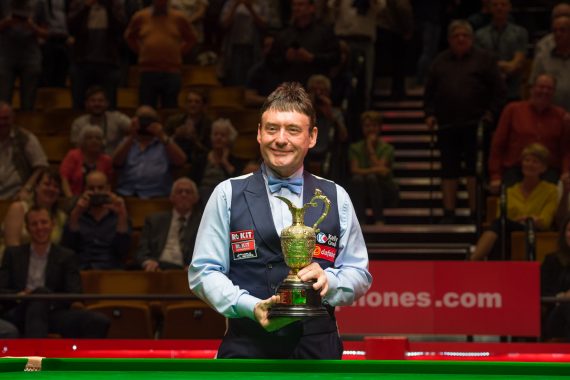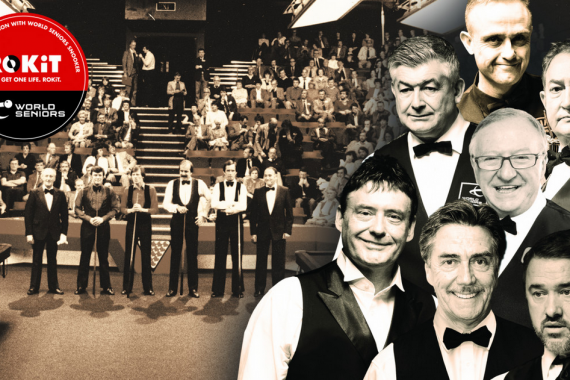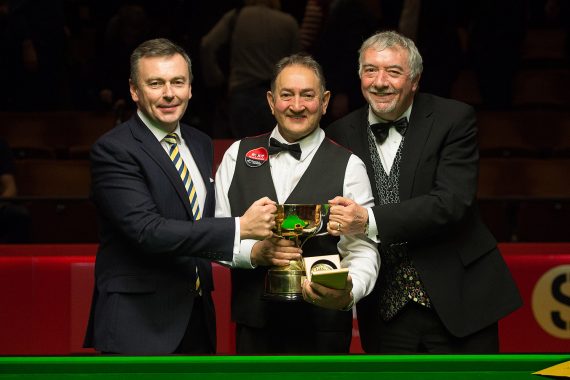Joe Johnson – Joe Johnson Special
This weekend sees the World Seniors Championship return to Portsmouth for a second successive year, as notably seven-times world champion Stephen Hendry will make his début in the competition.
Awaiting him in the first round will be 1986 Crucible king, turned Eurosport commentator Joe Johnson, a man who was instrumental in the return of seniors snooker to the big stage back in 2010 and was kind enough to take time out to speak to PSB ahead of this year’s tournament.
Click below to read Joe’s thoughts on the tournament, as well as his memories of his early days, his Crucible triumph and his thoughts on the game’s current stars…
PSB: Hi Joe, so this weekend will see the World Seniors Championship return to the Mountbatten Centre in Portsmouth, how much are you looking forward to seeing everyone again?
Joe Johnson: Oh absolutely, that’s one of the reasons that I resurrected it four years ago. One of the reasons that we went down that route is because we don’t see anybody these days, because we are not playing in tournaments. There’s only I think Steve Davis and Jimmy now that’s left.
It’s a big deal for some of the players to see everybody and have that camaraderie. It’s something I look forward to anyway.
PSB: As you say, you had a big role in getting the tournament off the ground didn’t you, the year Jimmy won it?
JJ: Yeah, myself and Dave Shipley, my business partner, we got it going and then Barry Hearn rang me up and said that he would like to be involved in it. World Snooker more or less do everything now, but we are still full partners.
PSB: How are you playing? Do you put much practice in these days?
JJ: I have yes and everybody else has as well, don’t let anybody tell you any different! Everybody wants to do well in it. I know that [Cliff] Thorburn is playing in an exhibition in the North East this week, so he is obviously keeping his hand in.
I have played everyday – when I’m not commentating that is – for the last six months. I made a maximum about three months ago and we were trying to find out if I was the oldest. David Hendon was putting the feelers out and looking back on the records. At 61…I can’t believe that I’m 61, I keep thinking that I am 28!
PSB: You haven’t had much luck with draws in this event over the past few years, drawing Steve Davis, John Parrott, Darren Morgan and now a certain Mr Hendry.
JJ: Yeah, three tough draws so far, but I was quite happy with the way that I played in all three.
Darren Morgan played exceptionally well last year when I played him. He probably played one of the best shots that I had ever seen anybody get in all my career. I had him in a lot of trouble and he had no option but to go for the pot and he knocked one in down the cushion, screwed all the way back to baulk and won the frame from it. You have just got to hold you hands up and say well played when something like that happens.
But yeah I have had some tough draws and there is none tougher than the best player that has ever lived…
PSB: You and Stephen have a bit of history too, the 1987 match at the Crucible (Joe won 13-12 in the quarter-finals)…
JJ: That sticks in my memory as one of the best matches that I have ever been involved in. I was 8-1 up until he brought it back to 9-7 and then it was 12-12 and I was a bit fortunate in the decider, I got in with a small break and got through.
But yeah I’ve had some great matches with him, I beat him in the final of the Monte Carlo Open, also we played in the Lang’s Scottish Masters the year that I won it. So yeah I’ve had some good results against him, obviously he has had good results against me.
It’s always a pleasure to play somebody like Stephen Hendry because you can always learn something from a seven-times world champion. It was the same with Steve Davis, you can always learn something from him. Even though I beat him in the final of the World Championship, I learned a lot from that.
PSB: Since he retired from playing competitively, Hendry has said that he hasn’t regretted the decision – how was retirement for you and your decision ultimately to hang up your cue? You are quite unusual for a world champion in that you carried on playing long after you had dropped out of the top 16?
JJ: I played on and on until I was forced out really, I broke my ankle and by the time I went back in I was out of the top 64, so I had no choice but to retire, or play on the qualifying school, but I didn’t want to do that. I would have been like Steve Davis, I’d have played on until I couldn’t play any more.
PSB: Obviously now you do a lot of commentary for Eurosport, how much do you enjoy that?
JJ: I love it, I love commentating. The only thing is that I can get a little bit frustrated because I can see a shot and it’s so easy to see from the comfort of a chair with no pressure. I can see a shot and I’m thinking ‘why don’t you play that’, sometimes it comes out and I might be a bit unfeeling sometimes and I have to stop and think that I’ve been there, I know how hard it is. I’ve been in the situation where I can’t add up when you stand there in the heat of the moment.
PSB: You often commentate with Dave Hendon, he knows his stuff doesn’t he?
JJ: Of course yeah, he knows every fact and figure that you can think of, from the top of his head too, which is amazing, amazing!
PSB: Snooker seems to be on TV almost every week of the year now – just a bit different from when you were growing up – am I right to say that you were largely self taught as an amateur player?
JJ: Yeah that’s right. I never really had any coaching, most of the top players of old, I don’t think they had any coaching. Steve Davis used to get a little bit from his dad, but he didn’t have any on the way up. He might have had some when he made it there, but to get to be world champion I don’t think he had any.
It was like that then, you would go to the local billiard hall and see the best player in there and copy a good style that they had got and attitude that they had maybe, and bring it into your own game. There were that many amateur matches to play that you picked a little bit up here and there from all of the good players.
PSB: I think I am right in saying that you had a reputation as struggling on TV at first too?
JJ: I did yeah, you won’t remember, you are too young! But I was struggling with the TV cameras. When the TV cameras weren’t there, it was a different kind of lighting actually going on the ball and because I had poor eyesight, I always found it difficult when that extra shine was around and it took me a while.
There was the pressure of playing on TV and the pressure of not being able to see properly.
PSB: That was the main thing then, the lighting?
JJ: Yeah, it’s a lot brighter and there were no shadows on the ball. Sometimes it can be easier when you are used to it, but if you are not used to it, it can be quite daunting and I understand why so many players fail the first time that they are on television on the match table.
PSB: Obviously no interview would be complete without talking about your world championship win in 1986 – funnily enough I was born in 1986!
JJ: You won’t remember the lot of it then!
PSB: [laughs] I have often seen you talk in particular about your match with Terry Griffiths in the quarter-finals…
JJ: Well yes, that was my turning point really because I don’t think that I had ever beaten Griffiths up to that point. He had beaten me in the English Amateur final and not only beaten me, but given me a right towelling! He’d also beaten me in the UK Championship previous to that and against did me a good towelling!
He always seemed to have the better of me did Griffiths, that’s probably because he was a better player, but that particular year I’d got myself into the top 16, so I had a little bit of belief in myself. It took a while to come through because I had been trying to get into the top 16 since I turned professional in 1980 or whatever it was, so 1985 was the first time that I was in it, so I was playing a qualifier.
I had that belief so when I played Griffiths, I felt that I was playing him on the same type of footing because I was in the top 16 and I had the belief and that was my turning point. I won 13-12 and I knew that I could beat anybody then, because I always had good results against Davis as an amateur and I had always had good results against Tony Knowles.
PSB: And the way that you finished it off, two centuries in the last four frames…
JJ: Yeah, at that time it was pretty good stuff. It is an everyday occurrence these days but back then it was a bit special!
PSB: Then into the final, how did you feel going into it and how did it feel throughout the tournament being the underdog and the person in the middle of the fairytale so to speak?
JJ: Yeah it took a lot of pressure off me because everybody, even my own family expected me to lose to Davis. Going into it I didn’t want to get beat by too much, I didn’t entertain thoughts of winning. I just tried to play as well as I possibly could and I did do that funnily enough. And after the first day it was eight each, I really believed I could win then.
PSB: How did winning the tournament change your life after winning it?
JJ: Well, I’m still working because of it Matt. It’s true, I’m still working because of it. This last week I got asked to open a shop in Wakefield. They wouldn’t have asked me if I had lost in the final. Nobody remembers who lost, what year they lost, things like that.
If you win the World Championship and you can be called World Champion, people remember you, especially in the Yorkshire area where I am still pretty well known.
PSB: After you won the tournament you must have been in high demand for exhibitions?
JJ: Every night, it was crazy, I didn’t work every night because my manager wouldn’t let me, but it was crazy for four or five years, especially in the Yorkshire area.
PSB: What are your favourite memories away from the World Championship, you must have also been proud of your run back to the final the following year…
JJ: I have come the closest to retaining it haven’t I? That was particularly good. When I played Stephen Hendry in the quarters, that was a fantastic match for me, but what sticks in my mind that second year is that it was Eugene Hughes in the first round. I only won 10-9 and I had recently done a tour of Australia with Eugene and I played him every day for three weeks and I never beat him in any of the days that we played.
We played nearly every day and who did I draw in the first round, Eugene Hughes! So it was a real tough draw for me that, especially with everybody saying that the defending champion always struggled and I was entertaining thoughts of ‘was I lucky the previous year’, a lot of that on my mind and then a tough draw like Eugene, so that stuck in my mind.
Winning the Lang’s Scottish Masters I beat Hendry and Griffiths again, which was the second time I had beaten him, that was pretty good. I won the Hong Kong Masters and there was another one in Thailand where I beat James Wattana in the final, so I had a pretty good year that year. Obviously they are not reported as they are not ranking events. I did win, but not many things because I didn’t turn professional until I was just below 30, 28, 29, something like that, so I turned professional late really.
I didn’t win the world championship until I was 35, so I was coming to the end of my career when I won it, although I was playing my best. A bit like Ronnie O’Sullivan and John Higgins last year. O’Sullivan at 37 is playing the best snooker I have ever seen him play!
PSB: You have just guessed by next question really! How much of an achievement is that for Ronnie to win the World Championship at 37 in the modern game?
JJ: Well I think for Ronnie to win the World Championship at 37 is unbelievable, it’s a fantastic achievement. I didn’t think that anybody over the age of 35, 36 would win it again, but John Higgins in special and so is Ronnie O’Sullivan.
I am so pleased that Ronnie decided to play on, he was entertaining thoughts of retirement, but I am pleased that he has played on because he is such a force in the game, he is great to watch and he attracts the crowds, I love watching him play.
And I can put up with his little antics off the table, the things he says off the table, because of what he does on the table.
PSB: Who else stands out for you out of the current top players? Obviously Neil Robertson is playing incredibly well at the moment, another three centuries in his first match this week in India…
JJ: Well I don’t think it has ever been done before, he made four centuries last week didn’t he? He won 4-0 and the other guy didn’t score. That has never been done before where another man has not scored in the entire match and the opponent has had centuries in every frame.
I know that O’Sullivan made five once, but there were frames that he lost in between. To make four centuries and your opponent doesn’t score at all, incredible, absolutely incredible. And he is a lovely guy as well.
PSB: Has anybody else, any young players stood out for you so far this season, you must see as much snooker as anybody these days with the Eurosport work!
JJ: I like Anthony McGill when I saw him playing of the new breed. I was expecting Jack Lisowski to do better this year having got into the to 32 with one match needed to qualify and I always like to see Judd Trump doing well because he is the type of player a bit like Ronnie O’Sullivan, because he goes for so many shots, you want him to do well for the bravery of taking them on. Mark Allen is another one, fantastic when things are going for him.
There are so many good players around now Matt that it is hard to put your finger on anybody, it is an exciting time for snooker I think!
PSB: And finally what is your view on the state of the game now with the flatter draws and what Barry Hearn has done, adding more tournaments to the calendar?
JJ: Well it has been a shot in the arm hasn’t it Barry Hearn taking over? He’s trying different things and some will work, some won’t but full marks for trying things.
I think one of the best changes is to have taken away the two-year rankings [where players retained the same ranking for a full season]. Now you are rewarded for how you play now and you can be in and out of the top 16 like a yo-yo now and at least it is rewarding the players that are playing well.
Many thanks to Joe for his time and best of luck to him next weekend at the 2013 World Seniors Championship, which you can watch exclusively on SkySports. Click here to view the draw at snookerorg.



